Bible Lessons International Collection (17 vols.)
Digital Logos Edition
Overview
Need some inspiration for preparing your next Bible study, Sunday school lesson or sermon? Or are you ready to take the next step in your personal Bible study and need some expert guidance? Check out these seventeen volumes of commentary and Bible survey from a master teacher who prepares Bible background materials for the Southern Baptist Convention Sunday School series. These materials are used by churches, prisons, hospitals, military bases, overseas missionaries and ministries, Bible study groups, and many individuals.
As a conference speaker, and former pastor and professor (department of religion at East Texas Baptist University), Dr. Bob Utley is uniquely qualified to write teaching material that will help you understand and present the Bible in a rich and compelling manner. He approaches Bible teaching from an exegetical, verse-by-verse, historical-grammatical point of view. Dr. Utley works to remove his (and our) social, cultural, experiential, and denominational biases. He supports his interpretation from the biblical text in one of five ways: (1) literary context; (2) historical setting of the biblical author; (3) word studies; (4) grammatical relationships; (5) parallel biblical passages and/or (6) genre.
This material is non-technical and walks the reader through the process of exegeting Scripture verse-by-verse and thought-by-thought. Where technical terms are used, they are defined in an appendix. Dr. Utley does not provide an interpretation so much as serve as a knowledgeable guide in the quest to identify the author's intention. He writes, "This is a study guide commentary, which means that you are responsible for your own interpretation of the Bible. Each of us must walk in the light we have. You, the Bible, and the Holy Spirit are priority in interpretation. You must not relinquish this to a commentator."
Dr. Utley founded Bible Lessons International in 1976 in Lubbock, Texas. Initially he taught the "Uniform" Sunday School series on local radio and television stations. In 1979, however, Dr. Utley felt the Lord leading him into an expanded media ministry. At that time a non-profit educational corporation was formed which began to produce all three Southern Baptist Convention Sunday School lesson series (Life and Work, Uniform [or International, used by all denominations] and Bible Book). Since that time the ministry has expanded into other areas of ministry both nationally and internationally.
A Word from the Author: How Can This Commentary Help You?
[Excerpted from the commentary on Hebrews.]
Biblical interpretation is a rational and spiritual process that attempts to understand an ancient inspired writer in such a way that the message from God may be understood and applied in our day.
The spiritual process is crucial but difficult to define. It does involve a yieldedness and openness to God. There must be a hunger (1) for Him, (2) to know Him, and (3) to serve Him. This process involves prayer, confession and the willingness for lifestyle change. The Spirit is crucial in the interpretive process, but why sincere, godly Christians understand the Bible differently, is a mystery.
The rational process is easier to describe. We must be consistent and fair to the text and not be influenced by our personal or denominational biases. We are all historically conditioned. None of us are objective, neutral interpreters. This commentary offers a careful rational process containing three interpretive principles structured to help us overcome our biases.
First Principle
The first principle is to note the historical setting in which a biblical book was written and the particular historical occasion for its authorship. The original author had a purpose, a message to communicate. The text cannot mean something to us that it never meant to the original, ancient, inspired author. His intent—not our historical, emotional, cultural, personal or denominational need—is the key...
Second Principle
The second principle is to identify the literary units. Every biblical book is a unified document. Interpreters have no right to isolate one aspect of truth by excluding others. Therefore, we must strive to understand the purpose of the whole biblical book before we interpret the individual literary units...
Interpreting at a paragraph level—not sentence, clause, phrase or word level—is the key in following the biblical author’s intended meaning. Paragraphs are based on a unified topic, often called the theme or topical sentence. Every word, phrase, clause, and sentence in the paragraph relates somehow to this unified theme...
Third Principle
The third principle is to read the Bible in different translations in order to grasp the widest possible range of meaning (semantic field) that biblical words or phrases may have. Often a Greek phrase or word can be understood in several ways. These different translations bring out these options and help to identify and explain the Greek manuscript variations...
This commentary offers a quick way for the student to check his interpretations. It is not meant to be definitive, but rather informative and thought-provoking. Often, other possible interpretations help us not be so parochial, dogmatic, and denominational. Interpreters need to have a larger range of interpretive options to recognize how ambiguous the ancient text can be. It is shocking how little agreement there is among Christians who claim the Bible as their source of truth.
These principles have helped me to overcome much of my historical conditioning by forcing me to struggle with the ancient text. My hope is that it will be a blessing to you as well.
Bob Utley
East Texas Baptist University
June 27, 1996
This title is included in the following collections
You can save when you purchase this product as part of a collection.
Logos 5 Gold Legacy Library
$849.99$849.99Logos 5 Platinum Legacy Librar...
$1,499.99$1,499.99Logos 5 Diamond Legacy Library
$2,999.99$2,999.99Logos 5 Portfolio Legacy Libra...
$4,749.99$4,749.99

- Title: Bible Lessons International Collection (17 vols.)
- Author: Bob Utley
- Publisher: Bible Lessons International
- Volumes: 17
- Pages: 3,895
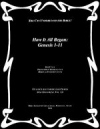
How It All Began: Genesis 1-11
- Author: Bob Utley
- Publisher: Bible Lessons International
- Publication Date: 2001
- Pages: 113
Not how, but Who-Not when, but why! The rest of the Bible cannot be understood without these opening chapters. God created a good world, a stage for fellowship with His highest creation, mankind. But mankind rebelled. This is not the world that God created it to be! He has committed Himself to restore it: (1) Messiah will come (cf. 3:15); (2) God calls one to call all (cf. 12:1-3); (3) God's grace is seen in: (a) promises; (b) covenants; (c) sacrifice and (d) worship.
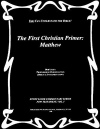
The First Christian Primer: Matthew
- Author: Bob Utley
- Publisher: Bible Lessons International
- Publication Date: 1997
- Pages: 263
The teachings of Jesus are presented in a thematic way. It was used to teach new converts about Jesus because it is the fullest and most systematic account of His life and message. The purposes of Matthew were evangelism and discipleship, the twin aspects of the Great Commission.
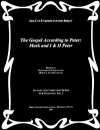
The Gospel According to Peter: Mark and I and II Peter
- Author: Bob Utley
- Publisher: Bible Lessons International
- Publication Date: 2000
- Pages: 325
The Apostle Peter is the obvious spokesperson for the Twelve. He was one of the first men chosen to follow and represent Jesus. Church tradition says that John Mark recorded Peter’s sermons in Rome and turned them into a Gospel for the Romans. Mark appears to have been the first written Gospel because its basic structure is used by both Matthew and Luke. However, because Mark begins at Jesus’ baptism and ends so abruptly, it was the least copied and quoted of all the Gospels because the early church saw it as an abridgment of the other Gospels. The Apostle Peter also has left us two small letters. I Peter deals with Christ’s suffering and is a pattern that believers are to emulate. II Peter addresses the problem of false teachers within the church (possibly incipient Gnosticism). It also deals with the delayed but certain Second Coming of Christ.
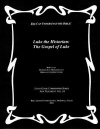
The Gospel According to Luke
- Author: Bob Utley
- Publisher: Bible Lessons International
- Publication Date: 2004
- Pages: 309
Luke is the longest Gospel. Luke-Acts contain the greatest number of verses by any author in the New Testament. He is a Gentile and a second-generation Christian (someone who did not see or know Jesus during His earthly life). Luke writes the most grammatically correct and polished koiné Greek of all the New Testament writers, with the possible exception of the author of Hebrews. Greek apparently was his mother tongue. He was also highly educated and a physician Luke records the eyewitness memories of Mary and also possibly her genealogy. His Gospel is based on interviews and research.
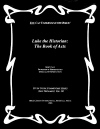
Luke the Historian: The Book of Acts
- Author: Bob Utley
- Publisher: Bible Lessons International
- Publication Date: 2003
- Pages: 309
Acts forms an indispensable link between the accounts of Jesus' life (Gospels), their preaching in Acts (Kerygma) and their interpretations and applications in the New Testament letters. The early church developed and circulated two collections of NT writings: (1) the Gospels (four) and (2) the Apostle (Paul's letters). However, with the rise of the Christological heresies of the second century, the value of Acts became obvious. Acts reveals the content and purpose of Apostolic preaching (the Kerygma), as well as the amazing results of the gopel message.
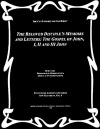
The Beloved Disciple's Memoirs and Letters: The Gospel of John, I, II, & III John
- Author: Bob Utley
- Publisher: Bible Lessons International
- Publication Date: 1999
- Pages: 279
John structures his presentation around miracles and signs, interviews, worship and feast days and "I Am" statements. It was written at the end of the first century when John was an old man. The letters of John answer questions about the deity and humanity of Christ, assurance of salvation, brotherly love, rejection of the fallen world system and recognizing false teachers.
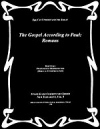
The Gospel According to Paul: Romans
- Author: Bob Utley
- Publisher: Bible Lessons International
- Publication Date: 2004
- Pages: 300
It is the most systematic and logical doctrinal book of the Apostle Paul. It was not written to answer a specific problem but it is the most neutral of Paul's writings. Paul was called to be the apostle to the Gentiles but he addresses both Jews and Gentiles and his letter shapes the life and teaching of Jesus into bedrock truths for the church of all ages.
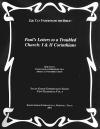
Paul's Letters to a Troubled Church: I & II Corinthians
- Author: Bob Utley
- Publisher: Bible Lessons International
- Publication Date: 2002
- Pages: 327
In these letters one sees the heart of pastor Paul and the practical-oriented, doctrinal mind of the Apostle to the Gentiles. These letters are a treasure of applied truth. Paul loved and worked with a factious, prideful, rebellious Gentile church, affected by Jewish false teachers.
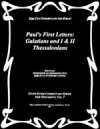
Paul's First Letters: Galatians and I & II Thessalonians
- Author: Bob Utley
- Publisher: Bible Lessons International
- Publication Date: 1997
- Pages: 167
These two books were the first writings of Paul. Galatians is a clear expression of the radically new and free truth of salvation by grace alone, through faith alone. It stirred the fires of the Protestant Reformation. The Thessalonian letters give us insight into the heart of Paul in the roles of pastor and missionary. It is the definitive work by Paul on the man of lawlessness and the second coming of Christ.
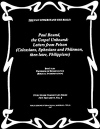
Paul Bound, the Gospel Unbound: Letters from Prison (Colossians, Ephesians, Philemon and later, Philippians)
- Author: Bob Utley
- Publisher: Bible Lessons International
- Publication Date: 1997
- Pages: 227
Each letter addresses specific problems facing the church. Paul proclaims the cosmic lordship of Christ and refutes legalism in Colossians. He speaks against the false teachings of Gnosticism. Ephesians has been called the "crowning jewel" of Paul's theology. It emphasizes the fact that Christ is the head of the church and that Christians must live appropriately. The theme of the letter is the unity of all things in Christ. The letter of Philemon is a private letter from Paul to Philemon, a slave owner in Colossae, regarding his slave Onesimus. The letter to Philippians includes one of the finest Christological passages in the New Testament. This church was one that Paul especially loved and he expresses his thankfulness to them for their love and monetary gifts. He encourages the believers to stand firm even in the midst of persecution.
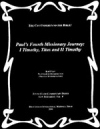
Paul's Fourth Missionary Journey: I Timothy, Titus, II Timothy
- Author: Bob Utley
- Publisher: Bible Lessons International
- Publication Date: 2000
- Pages: 203
These are called the Pastoral Epistles and were written by Paul. They give some guidelines concerning the organization or polity of the church. Paul also writes to refute emerging heresies in the church. II Timothy finds Paul in prison with little hope of release.
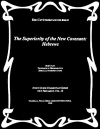
The Superiority of the New Covenant: Hebrews
- Author: Bob Utley
- Publisher: Bible Lessons International
- Publication Date: 1999
- Pages: 169
The book of Hebrews shows the superiority of Jesus' covenant over the old covenant. It uses many OT texts interpreted by rabbinical hermeneutics to communicate the message. Therefore, it is very important to interpret it in light of first century Judaism, not modern western thought. The author is unknown to us.The Jewish Christians are encouraged to leave the synagogue and identify publicly (fully) with the church. This book is filled with warnings against falling away, or returning to Judaism.
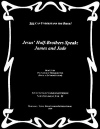
Jesus' Half-Brothers Speak: James and Jude
- Author: Bob Utley
- Publisher: Bible Lessons International
- Publication Date: 2000
- Pages: 139
James is a very practical book which emphasizes appropriate daily living. It is much like wisdom literature. Many of his teachings are paralleled in the sermon on the mount of Matthew 5 through 7. The book of Jude is a frightening book about the current danger of error, rebellion and judgment. Believers must always be on guard and remember that their protection is from God. The conclusion is one of the strongest prayers of affirmation of the keeping power of God in all the Bible.
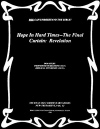
Hope in Hard Times—The Final Curtain: Revelation
- Author: Bob Utley
- Publisher: Bible Lessons International
- Publication Date: 2001
- Pages: 179
This is one of the most difficult books to interpret. We must be careful not to be dogmatic in our interpretation because godly people throughout history have disagreed on its meaning. It is a uniquely Jewish literary genre, apocalyptic, which was often used in tension-filled times to express the conviction that God was in control of history and would bring deliverance to His people. The author is believed to be the Apostle John. The setting was persecution caused by the separation of the Christian church from the legal protection Rome accorded to Judaism. Revelation was written to show God's sovereignty in history and the promise of the culmination of all things in Him. Christians are to remain faithful even amidst persecution, always remembering the blessed hope.
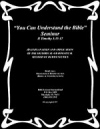
You Can Understand the Bible Seminar
- Author: Bob Utley
- Publisher: Bible Lessons International
- Publication Date: 1996
- Pages: 120
Subtitled An Explanation and Application of the Historical-Grammatical Method of Hermeneutics. This notebook details Dr. Utley's personal Bible study techniques, thoroughly explaining and demonstrating the application of the historical-grammatical method of Biblical interpretation. Dr. Utley has designed this seminar to be easily understood and practical. The method focuses on the inspiration of the original author. His day, his words, his purposes become the focus of interpretation. It cannot mean what it never meant!
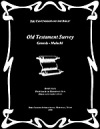
Old Testament Survey: Genesis - Malachi
- Author: Bob Utley
- Publisher: Bible Lessons International
- Publication Date: 2001
- Pages: 256
Each book of the Old Testament is analyzed by the following categories:
- Name of the book
- Canonization
- Genre
- Authorship
- Date
- Sources for corroborating the historical setting
- Literary units
- Main truths
- Special terms
- Map locations to plot
- Discussion questions
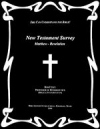
New Testament Survey: Matthew - Revelation
- Author: Bob Utley
- Publisher: Bible Lessons International
- Publication Date: 2000
- Pages: 210
Each book of the New Testament is analyzed by the following categories:
- Name of the book
- Canonization
- Genre
- Authorship
- Date
- Sources for corroborating the historical setting
- Literary units
- Main truths
- Special terms
- Map locations to plot
- Discussion questions
Dr. Bob Utley is a dynamic and inspirational Bible teacher. He feels that the Lord has given him a gift of relating to all types of people, especially those who have been turned off by "religiosity." Bob was born in 1947 in Houston, Texas. He is married to the former Peggy Rutta and they have three children and three grandchildren. He has earned degrees from East Texas Baptist College, Southwestern Baptist Theological Seminary, and Trinity Evangelical Divinity School and has done post-graduate work at Baylor University, Wycliffe Bible Translators' Summer Institute of Linguistics, and Trinity Evangelical Divinity School. He has pastored several churches in Texas. Currently Bob conducts revivals and Bible conferences both in the United States and abroad.
Reviews
2 ratings
Pastor Arnold McRay
12/8/2016

Paolo russo
1/1/2014
If you want to find ned interested stuff, which you dont find in another commentary, I usually check Utley. Plus nice questions.